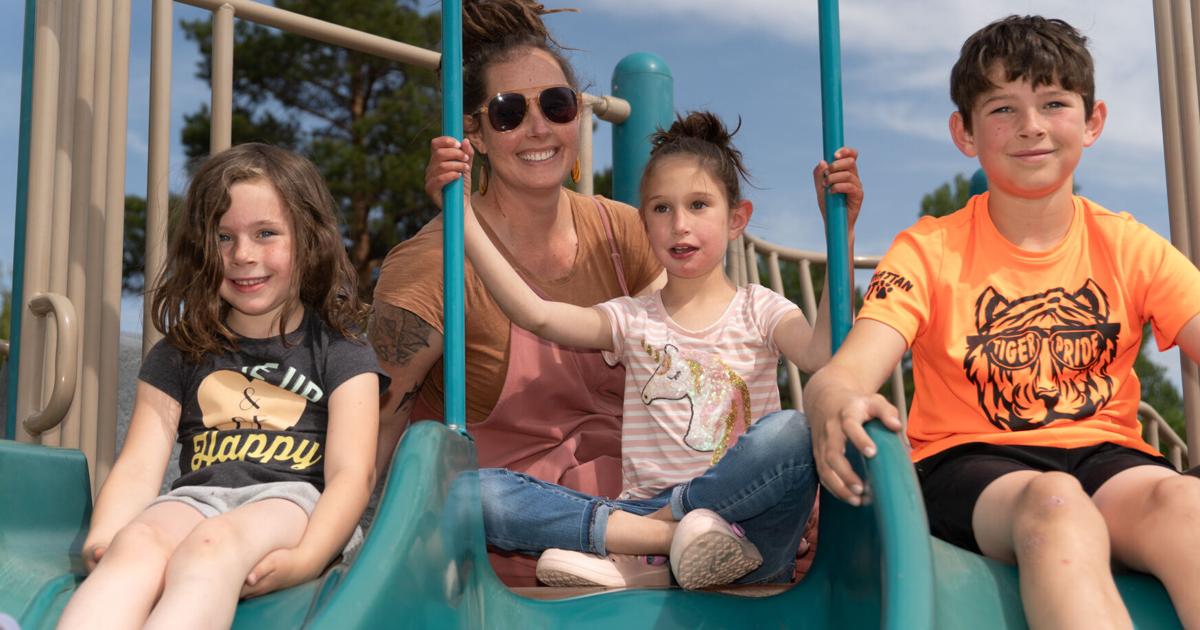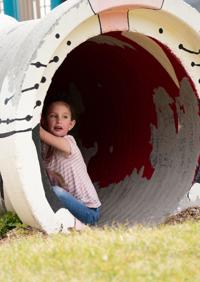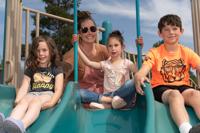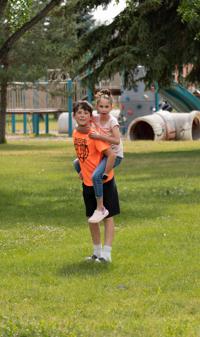Kelli Stanley remembers the phone call as nothing short of an answered prayer.
For nearly a decade, her family had searched for answers for her 9-year-old daughter Delilah’s condition. Earlier this spring, they decided to try one last test, a rare form of genetic sequencing through Shodair Children’s Hospital in Helena.
As with so many calls previously, she braced for more uncertainty. But this time was different.
This time, they finally had a name: ReNU syndrome, a newly discovered condition caused by variants in the RNU4-2 gene. Finally, they had an explanation for a debilitating collection of symptoms Stanley’s daughter Delilah had lived with since birth.
“It was the wildest phone call,” Stanley recalled. “They shared with me that even if we had done the test in years past, it still wouldn’t have come up with anything because it was just discovered in May 2024.”
The breakthrough came after researchers analyzing data from Genomics England’s 100,000 Genomes Project identified a link between the RNU4-2 gene to previously undiagnosed neurodevelopmental disorders. The discovery has had implications for families worldwide.
“As much as it doesn’t matter to have the diagnosis, it actually does in so many ways,” Stanley said. “It is massively easier to tell people my daughter has this thing … because prior I would have to say, ‘Developmental delay, hearing impairment, vision impairment, microcephaly’, I had to list all of the things. Then they would say, but what’s the diagnosis? And I’d say it’s all of those things. And they say, OK, we’ll just put you down for a developmental delay.”
“I’m like, it’s so much more than that.”
Delilah Stanley plays at a park on a recent afternoon.
Having a name for the condition has helped Stanley and her family better advocate for their daughter, who, as she understands it, is the only individual in Montana with an ReNU diagnosis. It’s also helped them make sense of the wide-ranging symptoms.
But while the diagnosis brought long-awaited answers, it also introduced a new set of questions.
“They have identified this genetic anomaly and the pieces that go with it, but what does that mean long-term? There are no long-term studies because it’s so brand-new,” Stanley said.
The road to diagnosis
Though the diagnosis is new, Stanley’s search for answers began before her daughter was born. During pregnancy, she noticed something different on the ultrasound; her daughter’s profile didn’t match that of her other children. It was a small detail, but one that confirmed her sense that something was off.
Her instinct proved right.
After Delilah was born, Stanley, her husband, Jay, and their four older children were thrust into a journey familiar to many parents of children with disabilities — one filled with uncertainty, countless questions and no immediate answers.
Although symptoms of ReNU syndrome vary from person to person, Delilah’s included a mix of low and high muscle tone, along with feeding and speech difficulties, hearing loss and intellectual delays. She was soon labeled “failure to thrive.”
“That was very hard,” Stanley said.
Still, the family quickly connected with local resources, including a pediatrician familiar with developmental disabilities and specialists in feeding, speech, gastroenterology and endocrinology.
As hope for a clear diagnosis faded, their focus shifted to meeting Delilah’s daily needs, though they continued pursuing genetic testing, round after round, despite consistently inconclusive results.
“I think the biggest diagnosis that we had overall was what they call Global Developmental Delay, which just meant that she was very behind. She didn’t walk until she was 2 and didn’t have any words until very late,” Stanley said.
That uncertainty, combined with Delilah’s fragile health, took a toll. Even a common cold could escalate into something serious requiring emergency flights to Billings for care that Bozeman emergency rooms couldn’t provide.
Stanley said the hardest part wasn’t just the fear of illness, but not knowing whether Delilah’s condition would worsen with age, or if she would survive something as simple as a seasonal virus.
But even in the hardest moments, she wasn’t entirely alone. Delilah’s siblings were her biggest champions. Their natural acceptance eased Stanley’s fears about how others might view her daughter.
Fletcher, mom, Delilah and Elwood at the top of the slide.
“The thing about having a lot of other kids, or even just siblings, for her, is that they don’t treat her any differently, which is really beautiful to see,” she said.
And as Delilah grew, so did the family’s ability to adapt.
Between doctor visits, specialist appointments, and hospitalizations, new milestones emerged, along with challenges the family hadn’t faced with their other children, such as needing to break down every movement for crawling and, eventually, walking, step by step.
As Delilah reached school age, the family arranged for full-time aides to provide one-on-one assistance during the day. At home, Stanley and her husband juggled care while running their own businesses — Kelli as founder of Tree of Life Doula Care, a holistic pregnancy care center, and Jay as owner of Stanley Woodworking.
Even with that full schedule, the search for answers never stopped. Their persistence eventually led them to the Undiagnosed Diseases Network in Salt Lake City. There, Delilah’s case was entered into a global database of unknown genetic conditions accessible to researchers around the world.
That connection, paired with continued support from the genetics program at Shodair, opened the door to the most advanced testing the family had undergone so far: Exome sequencing.
This large-scale genomic test, using saliva samples from Delilah and her parents, examines the roughly 20,000 protein-coding regions of the genome, just 1% of a person’s DNA but the part most likely to reveal changes tied to a disease or specific symptoms.
Inside the diagnosis
Ellen Job, a certified genetic counselor who has been treating Delilah at Shodair since 2022, said this kind of testing has only become widely available in recent years. However, limited access and lack of insurance coverage made it difficult for many families to pursue.
“There are so many different conditions, and genetics can get really complicated, and there’s no one test that looks for everything,” Job said. “Until recently, this is the biggest test we have available. It still doesn’t look for everything, but it is the only test that could have found this particular change.”
Throughout Delilah’s journey, genetic nurse practitioner Willow Sheehan, who has worked closely with the family since 2020, said uncertainty is often an inherent part of the diagnostic process, especially with rare or newly discovered conditions.
“The big thing that we do to help families cope with uncertainty, even at that initial conversation, we explain that there’s a high likelihood of uncertainty — and that the most likely scenario is that we won’t find a clear diagnosis for their child.” Sheehan said. “But over time, we can go back and review the data from these testing techniques. Just because we don’t find a diagnosis with the first test doesn’t mean we won’t find one eventually.”
Even when a diagnosis is made, uncertainty remains. Sheehan said families are told what’s known and that the picture might change as more is learned.
How families respond to that uncertainty, she added, can shape their diagnostic path.
“Some people really sort of pump the brakes with further genetic testing, because the uncertainty is so frustrating, and we don’t see them for several years — and then they’ll come back to us and that’s OK,” she said. “Whereas other families are really information-seeking, and they’re OK with uncertainty, or they’ll sort of delve into the research themselves and become really engaged with the community for disease states — and honestly become part of what’s driving the research on that condition.”
Finding connection
For the Stanleys, that sense of connection came quickly. As soon as Delilah’s ReNU diagnosis was confirmed, they sought out others on a similar path. Stanley joined online communities and Facebook groups filled with families who had also just received a name for their child’s condition.
Elwood Stanley goes above and beyond to take care of his little sister.
“It was the most amazing thing just to have that, because there are so many kids that are being diagnosed right now that have waited such a long time. I think the oldest child that I know of right now is 19,” she said. “The excitement and the love and the support that’s happening in that Facebook group — people are just posting, ‘Oh my gosh, we found each other.’”
While the exact number of confirmed cases remains unknown, ReNU Syndrome United estimates the condition could affect up to 100,000 individuals worldwide.
But for Stanley, the most meaningful part of the diagnosis was knowing they weren’t alone.
“You find your people in this,” she said.
Later this month, she’ll join dozens of other ReNU families in New York for the inaugural ReNU Hope Family Conference & Scientific Symposium. Hosted by ReNU Syndrome United, the event will offer a rare opportunity for families to meet in person and connect directly with researchers working to better understand the condition and explore potential treatments.
“It feels really important because not only is this conference designed for families to meet up and interact, but the researchers are there. They’re coming from all over the world and they want to talk to us, they want to know what our struggles are. They want to put faces to the research,” she said.
Looking ahead with hope
Sitting on the front steps of her Manhattan home as the early rays of summer fall around her, Stanley paused, watching as Delilah moves from playing in the gravel portion of their driveway to bounding up the wooden steps and squeezing her in a tight embrace.
Despite every isolating and uncertain moment that filled her family’s nine-year search for answers, there has also been love, hope and, most important, the joy of witnessing her daughter reach milestones that once seemed unimaginable: Beginning to communicate through American Sign Language, jumping on a trampoline with her siblings and even simply learning to walk.
By sharing her story, Stanley hopes other families, whether their children have ReNU syndrome, another disability or are still searching for answers, know they’re not alone.
“It doesn’t have to feel like the end of things,” Stanley said. “There was certainly a time when she was first born that it just felt so hard, so terribly challenging. As a mom, there’s this piece of feeling like you’re already a failure before you even get started. With a child who doesn’t eat well and the term ‘failure to thrive’ — it’s the most awful thing to hear.
“But know that there’s a way through; it’s just really hard. I’ve had to practice a lot of mindfulness. Therapy is great, but also giving yourself lots of grace and asking for support — and being OK with support.”
Although unanswered questions remain about ReNU’s long-term prognosis and underlying causes, Stanley said her family is focused on the present: Being there for Delilah and trusting the science to catch up.
“We’re holding out hope that one day they’ll get an answer,” she said. “I really truly believe she’s supposed to be here. This is who she is. I have something to learn from her. My kids have learned a lot. I think that these special needs kids are really special and they have something to share, and that gives me comfort.”
Get any of our free daily email newsletters — news headlines, opinion, e-edition, obituaries and more.



